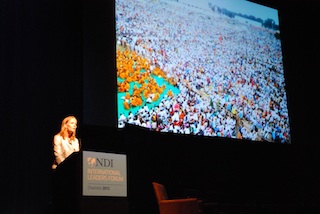Marietje Schaake on the new "Internet Public" - from the DNC International Leaders Forum

Cross-posted from the NDI ILF blog.
“How can we foster democracy in a hyper-connected world?” asked Dutch Member of the European Parliament, Marietje Schaake. During a TED-style talk she focused on the implications of the rise of the “Internet public,” global citizens connected by new communications technology. Schaake discussed new opportunities for empowering the "Internet public", while warning of weakening governments and strengthening corporations. While the Internet has created openness, regimes and groups who fear giving up power are also using it to repress citizens.
Schaake was inspired by the example of Neda Agha-Soltan, killed in Iran during post-election protests in 2009. Because the world saw that Iranians could fight their fear, others came to believe anything was possible. Since then, Iran has decided the only way to control their citizens is to create a “halal” intranet, separate from the rest of the world. She listed Syria, China, Iran and Tunisia prior to the ouster of President Ben Ali as authoritarian regimes that also use online tools to repress and control, but noted that such problems are not exclusive to autocratic governments — democracies have also created their own repressive laws.
Schaake was particularly concerned with the rising power of corporations. The Internet, she said, is often thought of as a public space, but is mostly owned by private corporations that are not necessarily working to further human rights. The Internet requires further legislation and regulation by governments, but at the same time governments are leaking power, both to citizens and to private companies. While she sees this development as exciting and positive for individual citizens, the lack of transparency in how corporations regulate the themselves and the Internet is worrisome.
Schaake concluded that government alone cannot keep the networks open. An “organic multi-stakeholder model” has emerged, bridging corporations, governments, NGOs and individuals to best serve the interests of the Internet public. Once we are all together, says Schaake, “we can work on true democracy.”
For more thoughts from Schaake on online freedoms and the role of the Internet public, read her recent piece on the topic in the Huffington Post.
